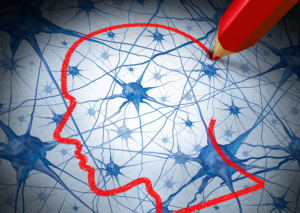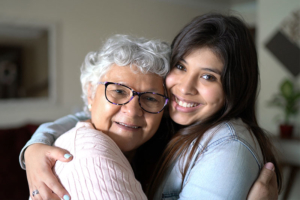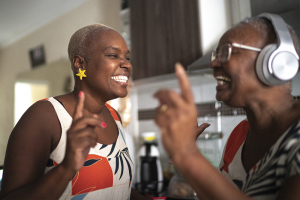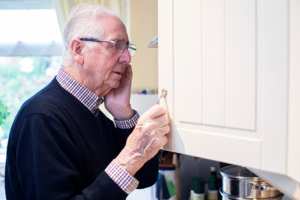How Reminiscence Therapy Can Help Seniors With Alzheimer’s Stay Engaged

To help seniors stay engaged, reminiscence therapy provides a way to walk down memory lane.
Memory loss and dementia may seem synonymous. Yet it is crucial to realize that long-term memory frequently remains intact long into the progression of the disease. Because of this, tapping into those distant memories is an easy strategy to help a loved one with Alzheimer’s stay engaged in current conversations by connecting to the past.
Known as reminiscence therapy, these walks down memory lane help seniors:
- Minimize some of the adverse effects of Alzheimer’s, for example , restlessness, anger, wandering, and more
- Decrease negative emotions and stress by shifting the focus to happier times
- Instill self-confidence by bringing to mind the many accomplishments they have made as well as the lives they’ve impacted
- Better connect to others through sharing stories
Implementing reminiscence therapy doesn’t need to be elaborate. Start with opening a photo album and simply taking a look at pictures together. Let the person drive the next steps. If a particular photograph sparks a memory and the senior wants to share that, keep the conversation going as long as they would like. If they choose instead to view the photographs silently, you can do the same, while assessing the person’s expression to make sure they are calm and relaxed.
Just as photos can bring enjoyable memories to the surface, they can also remind the senior of friends and family lost, or of a particularly hard time in their life. If the activity invokes anxiety, close the book and move on to something else. It may take a little coaxing to switch gears if the person seems distraught. Moving to a different location, such as outdoors or to the kitchen for a snack, can help. Or try bringing up an alternative memory from a period you know was a positive experience for the older adult.
Other ideas for reminiscing include:
- Smelling familiar, enjoyable scents which could have meaning for the person: freshly mowed grass, flowers that grew around their family home as a young child, a particular brand of shampoo, bubble bath, or soap they used to bathe the kids when they were little, etc.
- Making a recipe the older adult especially enjoys and eating it together
- Engage in an ability-appropriate activity that holds meaning to the past: sorting buttons or nuts and bolts, filing papers, painting, knitting, playing a musical instrument, etc.
- Listening to favorite music from the past
Let our creative dementia care team help! Find out how a home health aide in Hollywood, FL or the surrounding areas from Responsive Home Care can provide ideas for effective reminiscence therapy that will help a senior you love live life to the fullest. Contact us at 954.486.6440 to learn more.

 Picture for a second how it could feel to struggle with the cognitive obstacles of Alzheimer’s disease. The people who are closest to you are no longer familiar. The words that would roll off your tongue without a second thought are now just beyond your grasp. In fact, the whole world as you once knew it has turned completely upside down, leaving you yearning for a recognizable foothold.
Picture for a second how it could feel to struggle with the cognitive obstacles of Alzheimer’s disease. The people who are closest to you are no longer familiar. The words that would roll off your tongue without a second thought are now just beyond your grasp. In fact, the whole world as you once knew it has turned completely upside down, leaving you yearning for a recognizable foothold. If there is one constant thing in the race to solve the puzzle of Alzheimer’s, it is change. It appears as though any time researchers start to get a grasp on one piece of information, new information shifts their hypotheses in an alternative direction. That is most certainly the situation with the amazing new developments in
If there is one constant thing in the race to solve the puzzle of Alzheimer’s, it is change. It appears as though any time researchers start to get a grasp on one piece of information, new information shifts their hypotheses in an alternative direction. That is most certainly the situation with the amazing new developments in  Distress. Fear. Embarrassment. The thoughts and feelings surrounding a potential Alzheimer’s diagnosis may cause older adults to keep their suspicions to themselves. A recently available
Distress. Fear. Embarrassment. The thoughts and feelings surrounding a potential Alzheimer’s diagnosis may cause older adults to keep their suspicions to themselves. A recently available  A new study sponsored by the Alzheimer’s Association is uncovering some striking findings in how dementia may present differently in Hispanic people. While additional exploration is required to fully understand whether these differences are the result of social/cultural nuances or perhaps the dementia itself, it’s worthwhile information for Latino families to know.
A new study sponsored by the Alzheimer’s Association is uncovering some striking findings in how dementia may present differently in Hispanic people. While additional exploration is required to fully understand whether these differences are the result of social/cultural nuances or perhaps the dementia itself, it’s worthwhile information for Latino families to know.





